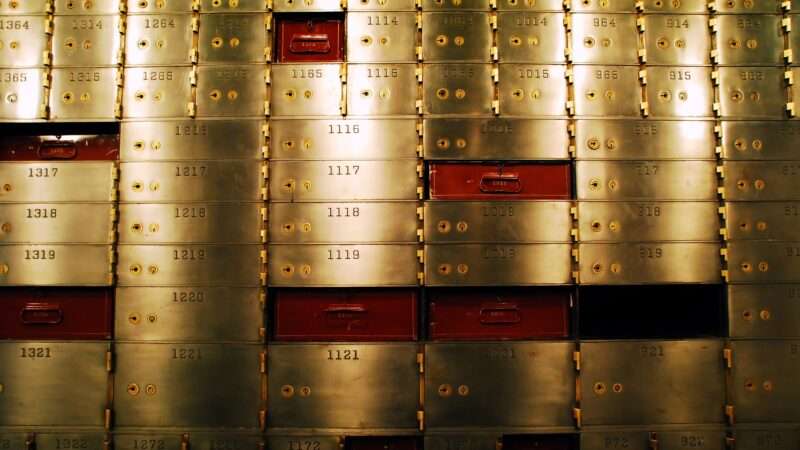
A federal judge issued a sharp rebuke to the FBI’s attempt to expose the identity of one of the anonymous victims of a March raid that seized more than $86 million in cash, jewelry, and other valuables from safe deposit boxes in Beverly Hills, California. Now a new legal effort is seeking to force the government to explain its own still-secret justification for the raid.
In a ruling issued last week, U.S. District Judge Gary Klausner rejected prosecutors’ request to dismiss a lawsuit filed by the owner of Box 904, one of more than 600 safe deposit boxes seized by the FBI during the March 22 raid of U.S. Private Vaults. The box-holder, identified in court documents under the pseudonym “Charles Coe,” claims to have lost more than $900,000 in cash and other valuables. In trying to get the lawsuit dismissed, prosecutors also asked Klausner to force Coe to identify himself publicly before returning the seized property.
“If the government believes that plaintiff did not lawfully possess the contents of box number 904, the government can, of course, defend this suit on that basis,” Klausner wrote. “But the government has made no showing that plaintiff possessed the items seized from box number 904 unlawfully.”
Later, he added that the government’s case against Coe has not been based on “anything more than pure conjecture that plaintiff might have unlawfully possessed the items seized from box number 904.”
That’s been true for much of the government’s case against the hundreds of safe deposit boxes seized from U.S. Private Vaults. When the FBI raided the facility on March 22, agents were armed with a warrant that explicitly forbade them from seizing the contents of the safe deposit boxes kept there. But the FBI took them into custody anyway. In May, the FBI filed administrative forfeiture proceedings against 369 of the nearly 800 boxes seized—including more than $85 million in cash and other valuables.
A federal grand jury indicted U.S. Private Vaults on a number of charges, including conspiracy to launder money and sell drugs. Michael Poliak, one of the co-owners of U.S. Private Vaults, has a lengthy criminal history that includes money laundering and may have used “dirty” money to purchase a stake in the company, according to an affidavit filed by an undercover police officer and published earlier this week by The Daily Beast.
As Reason has previously reported, prosecutors have tried to argue that the alleged misdeeds of the company’s owners should turn their customers into suspects, too. In court filings, prosecutors have said “some” of U.S. Private Vaults’ customers were “honest citizens,” but contended that “the majority of the box-holders are criminals who used USPV’s anonymity to hide their ill-gotten wealth.”
But all that conjecture, as Klausner noted, has not yet added up to much in the way of actual prosecutions against U.S. Private Vaults’ customers who had their valuables swept up in the raid. Poliak is not facing criminal charges either.
Lawyers representing some of the raid’s victims say the FBI’s sweeping seizure of the safe deposit boxes was a serious violation of the Fourth Amendment—akin to searching every unit in an apartment building because the management company stands accused of some crime. Meanwhile, prosecutors’ insistence that U.S. Private Vaults’ anonymous clients identify themselves before being able to seek a legal remedy runs afoul of the Fifth Amendment’s protections against self-incrimination.
The FBI has returned the contents from some of the seized safe deposit boxes, but only after brazenly rifling through private documents and potentially misplacing some box-holders’ valuables in an apparent attempt to find evidence of criminal activity.
A major piece of the U.S. Private Vaults saga remains hidden, as the government has unsealed only one of the two warrants that it claims were used to justify the raid in the first place.
Michelle Friedman Gerlis, one of the box-holders whose property was seized as part of the March 22 raid at U.S. Private Vaults, filed a motion in federal district court this week requesting that all warrants and supporting affidavits be made public.
“There is no question that Ms. Gerlis is entitled to copies of the documents that the government purported to rely on when it searched and seized the contents of her safety deposit boxes,” Benjamin Gluck, the California attorney representing Gerlis (and other victims of the raid) wrote in court filings. “Indeed, the law is clear that she has a constitutional right of access to them under the Fourth Amendment.”
The legal issues surrounding the still-secret warrant go beyond the acute legal issues facing Gerlis and the other plaintiffs in the U.S. Private Vaults saga. Those documents should be made public because of what they could reveal about how the FBI constructed a rationale for its brazen raid that resulted in hundreds of Americans potentially losing money and valuable assets despite not being charged with a crime.
To that end, Reason has joined Gerlis’ lawsuit seeking to unseal the warrant.
“Reason intends to continue reporting on the Government’s seizure of property from customers of U.S. Private Vaults and asserts a First Amendment right to review and inform the public about the content of the warrant material,” writes Mike Alissi, Reason‘s publisher, in court filings this week.
Prosecutors seem to have approached the U.S. Private Vaults under the assumption that they can force innocent safe deposit box owners to disclose their identities in order to secure the return of their property—all without providing claims of wrongdoing. And that they can do that while keeping their own legal justifications secret. Federal courts should continue to eye those arguments with a healthy degree of skepticism.
from Latest – Reason.com https://ift.tt/2VgBMb5
via IFTTT